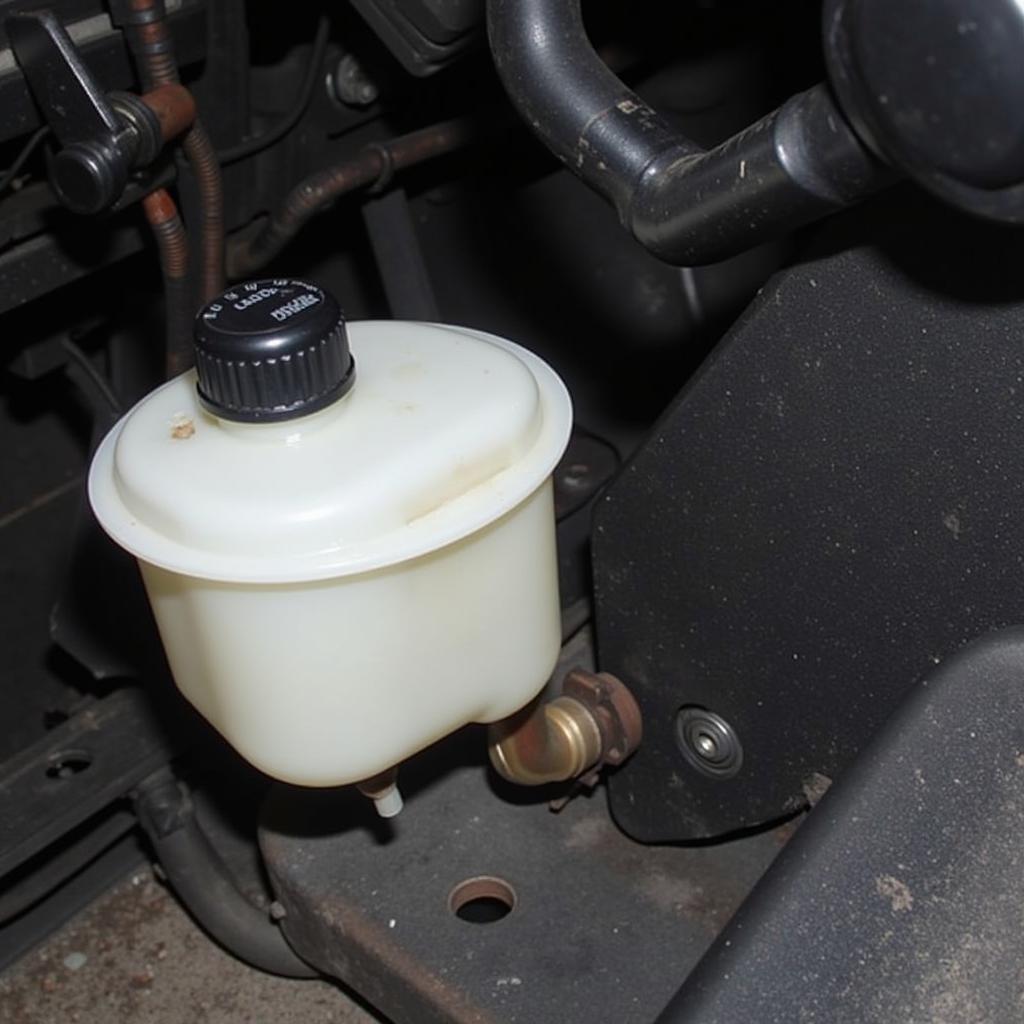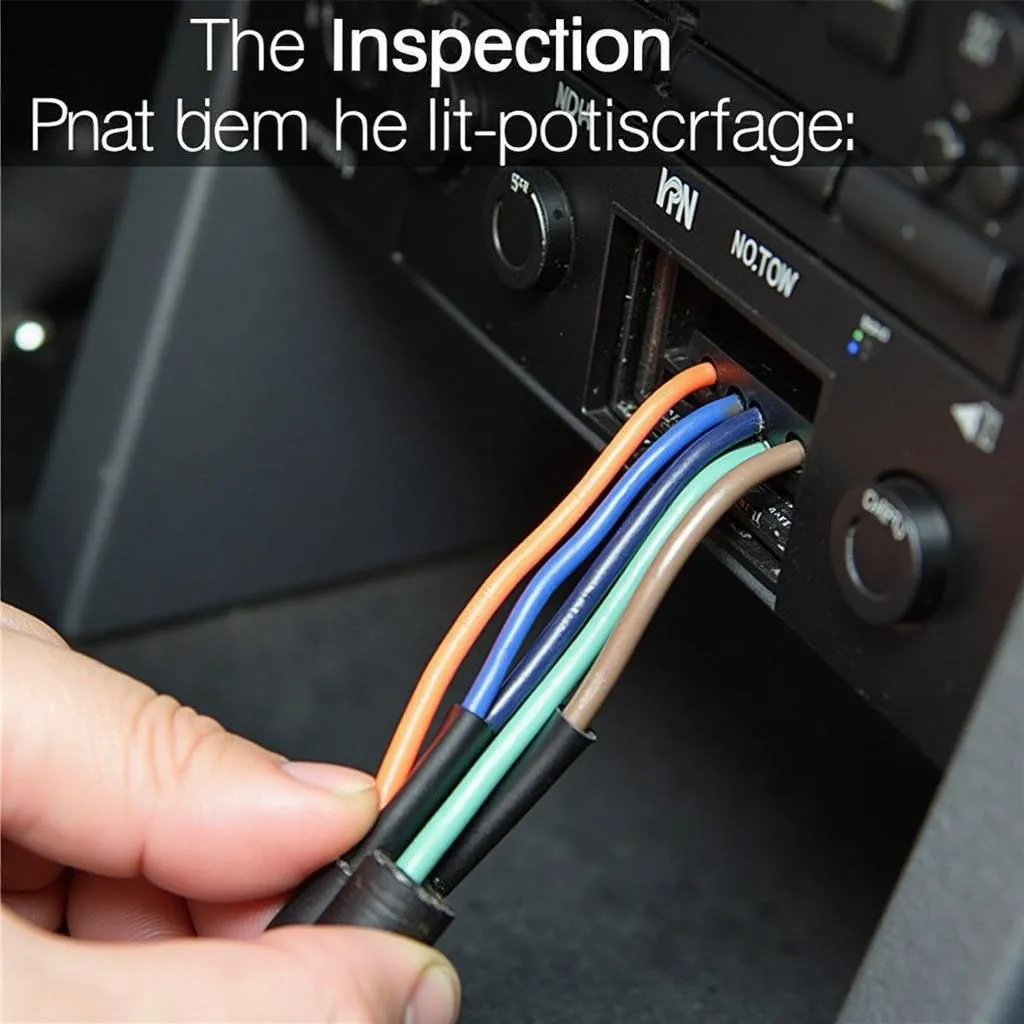The dreaded brake fluid warning light illuminating on your Ford Focus dashboard can be a nerve-wracking experience. This light typically signals a problem within your vehicle’s braking system that requires immediate attention. Ignoring this warning could lead to significantly reduced braking power, compromising your safety and the safety of others. This comprehensive guide will delve into the common causes of the Ford Focus brake fluid warning light, how to diagnose the issue, and potential solutions.
Understanding Your Ford Focus Brake Fluid Warning Light
The brake fluid warning light, usually symbolized by an exclamation mark within a circle resembling a brake caliper, serves as your car’s early warning system for brake fluid issues. When illuminated, it indicates a drop in brake fluid level or a potential problem with your braking system’s hydraulic pressure.
Common Causes of a Ford Focus Brake Fluid Warning Light
1. Low Brake Fluid Level
The most common culprit behind a glowing brake fluid warning light is a low brake fluid level. As brake pads wear down, the brake caliper pistons extend further to compensate, requiring more brake fluid. A leak anywhere in the braking system can also lead to a significant drop in fluid level.
2. Worn Brake Pads
Worn brake pads are another frequent cause. As your brake pads wear down, the brake caliper pistons need to extend further to engage the brake rotors. This extension requires more brake fluid, eventually triggering the warning light if the pads are not replaced.
3. Brake Fluid Leak
A leak within the braking system, whether from a brake hose, caliper, master cylinder, or other components, can result in a rapid loss of brake fluid. This leak not only triggers the warning light but also significantly compromises your vehicle’s braking ability.
4. Faulty Brake Sensor
While less common, a faulty brake fluid level sensor in the master cylinder reservoir can also trigger the warning light. This sensor monitors the fluid level and sends a signal to illuminate the warning light if it detects an issue. However, a malfunctioning sensor may provide a false positive, even if the brake fluid level is adequate.
Diagnosing the Problem
If your Ford Focus brake fluid warning light comes on, it’s crucial to diagnose the issue promptly. Here’s a step-by-step guide:
- Check the Brake Fluid Level: Park your car on a level surface and turn off the engine. Locate the brake fluid reservoir, usually a translucent plastic container with a black cap labeled “Brake Fluid.” Check the fluid level against the minimum and maximum markings on the reservoir.
- Inspect for Leaks: Visually inspect all brake lines, hoses, and components for any signs of leaks, such as wet spots or dripping fluid. Pay close attention to the areas around the wheels and under the vehicle.
- Assess Brake Pad Condition: If the fluid level is low or you suspect a leak, it’s essential to check your brake pads. Worn brake pads often contribute to low brake fluid levels.
What to Do When Your Ford Focus Brake Fluid Warning Light Turns On
Warning: Driving with low brake fluid or a suspected brake system leak is extremely dangerous. If you experience any braking abnormalities or notice a significant fluid loss, it’s crucial to stop driving immediately and have your vehicle towed to a qualified mechanic.
If the warning light comes on and you observe a low brake fluid level but no apparent leaks, you can carefully add the correct type of brake fluid to the reservoir to bring it to the maximum level. However, it’s crucial to consult your owner’s manual for the recommended brake fluid type and follow the instructions carefully.
When to Seek Professional Help
While adding brake fluid might seem like a simple task, it’s always best to consult a qualified mechanic if you’re uncomfortable performing this procedure yourself.
You should seek professional assistance if:
- You are unsure about the cause of the warning light.
- You are uncomfortable adding brake fluid yourself.
- You suspect a brake fluid leak.
- You notice any unusual noises or sensations when applying the brakes.
- The warning light remains illuminated even after adding brake fluid.
Expert Insights
“Many car owners underestimate the importance of regular brake fluid flushes,” says John Smith, a certified automotive technician with over 20 years of experience. “Brake fluid is hygroscopic, meaning it absorbs moisture over time. This moisture contamination can reduce braking performance and even lead to costly damage to brake components. I recommend flushing your brake fluid every 2 years or as recommended by your vehicle manufacturer.”
“A common mistake I see is using the wrong type of brake fluid,” adds Smith. “Using the incorrect fluid can damage brake system seals and compromise braking performance. Always consult your owner’s manual or a qualified mechanic to determine the correct brake fluid type for your Ford Focus.”
Conclusion
A glowing brake fluid warning light on your Ford Focus dashboard should never be ignored. By understanding the potential causes, performing a visual inspection, and seeking professional help when needed, you can ensure a safe and enjoyable driving experience. Remember, regular maintenance and timely repairs are key to keeping your braking system in optimal condition and preventing costly repairs down the road.
Frequently Asked Questions
1. Can I drive my Ford Focus with the brake fluid warning light on?
It’s highly discouraged to drive with the brake fluid warning light illuminated. This light signals a potential problem with your braking system, and continuing to drive could be dangerous.
2. How often should I check my brake fluid level?
It’s a good practice to check your brake fluid level at least once a month or as recommended in your owner’s manual.
3. How much does it cost to fix a brake fluid leak?
The cost of repairing a brake fluid leak varies depending on the severity and location of the leak. It’s best to consult a qualified mechanic for an accurate estimate.
4. How long can I drive with low brake fluid?
You should not drive with low brake fluid. If you notice your brake fluid level is low, add the correct type of brake fluid to the reservoir or consult a mechanic as soon as possible.
5. Can I add brake fluid myself?
Yes, you can add brake fluid yourself if you’re comfortable doing so. However, it’s crucial to consult your owner’s manual for the recommended brake fluid type and follow the instructions carefully.
6. Is it normal for the brake fluid level to drop slightly over time?
A slight drop in brake fluid level over an extended period is normal due to brake pad wear. However, a sudden or significant drop indicates a potential leak that requires immediate attention.
7. What happens if I run out of brake fluid while driving?
Running out of brake fluid while driving is extremely dangerous as it will significantly reduce or completely eliminate your braking ability. This situation can lead to a complete brake failure, putting you and others at risk of a serious accident.


